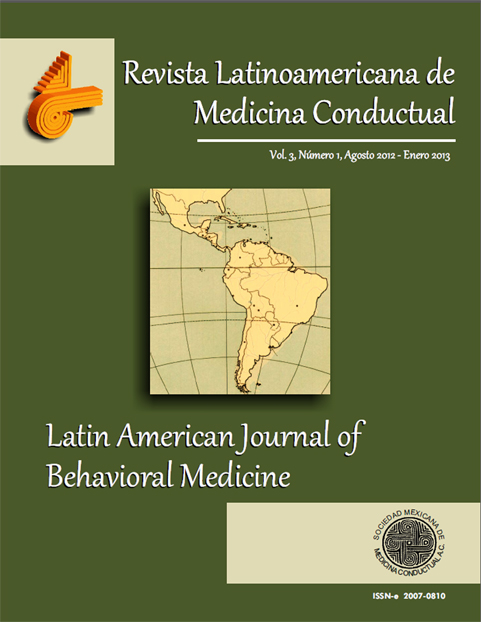Distress and coping strategies in type 2 diabetes patients: Evaluation and Intervention
Main Article Content
Abstract
The objective of this investigation was to determine the efficacy of a cognitive-behavioral intervention tomodify the diabetes related-distress level and the coping strategies level for patients with Type 2 Diabetes.The variables were measured from the versions adapted for Mexican populations from the problem areas inDiabetes Scale and the Personal Coping Strategies Scale by Moos. The sample included 13 patients. Theywere randomly assigned into two groups: an experimental group, and a control group. Intervention sessionswere administered once a week over a period of three months. Each one of the 12 sessions, lasted two hours.Four months after the sessions had concluded the patients were observed once more. Results were comparedpre-post-following administration using the Friedman Test per group. Results showed statisticallysignificant changes by the end of the intervention in the diabetes related-distress level in the experimentalgroup. These effects were also evident at the end of the four months period after sessions had concluded. Thefindings of this investigation suggest that cognitive-behavioral interventions are effective in themodification of these variables for patients with Type 2 Diabetes.
Article Details
How to Cite
Del Castillo Arreola, A., Morales Téllez, O., & Solano Solano, G. (2015). Distress and coping strategies in type 2 diabetes patients: Evaluation and Intervention. Revista Latinoamericana De Medicina Conductual / Latin American Journal of Behavioral Medicine, 3(1). Retrieved from https://journals.unam.mx/index.php/rlmc/article/view/46900
Citas en Dimensions Service

Este obra cuyo autor es Universidad Nacional Autónoma de México está bajo una licencia de Reconocimiento-NoComercial-SinObraDerivada 4.0 Internacional de Creative Commons.
Creado a partir de la obra en http://www.revistas.unam.mx/index.php/rlmc.
